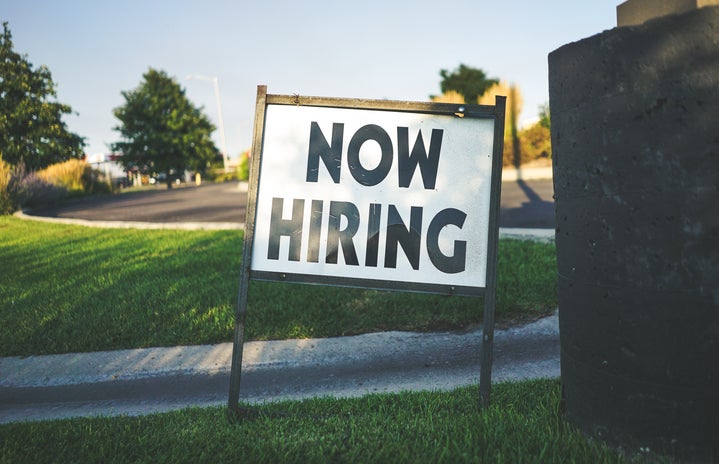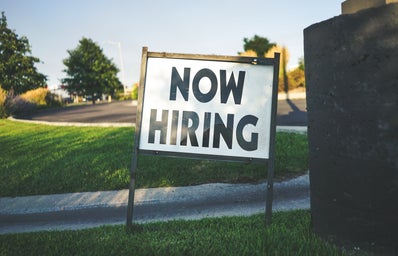You’re sitting on your couch drinking instant coffee and hopelessly scrolling down the list of jobs on Monster.com, when you receive an unexpected call. It’s the Human Resources department of your dream job calling you in for an interview that starts in an hour. Adrenaline pumping, you jump up from the couch and realize you’re still in your bunny slippers and sushi pajamas. What’s next? How can you impress your future employer with just one glance? To help, HC’s dug up some tips on what to wear and bring to a job interview so this won’t be the last you hear from them.
What to wear:
Dress the way you want to be perceived.
For hopefuls in the arts or a more creative field such as fashion, publishing or photography, wear something that’s traditional, but still shows off your personality, such as an unusual pattern or a “notice me” accessory. For those interested in business or more conservative fields, looking professional is the main factor appearance-wise. If you show up looking disheveled with your shirttail hanging out and your hair uncombed, many employers won’t even consider you. Suits are normally a requirement, with a non-revealing top to go underneath them. For shoes, wear a simple yet stylish working pump that gives you some height and a sense of presence, but please leave the stripper heels at home. Be careful not to wear any excessive or dangly jewelry that would detract from, rather than promote, your image. “Job interviews are not the place to make major fashion statements,” says Elinor Burstein, a career counselor at Career Place. “It’s more important to have self-confidence in how you look. Wear something that will make you feel like a princess while remaining professional. Pretend like you’re meeting your boyfriend’s parents for the first time. You want to make a good impression!”
Don’t dare to go bare.
Always wear hosiery to an interview no matter how tan you may be. Unless you’re in a more creative field, shy away from the flashier, patterned options and stick with neutral colors that complement your suit. The interview should be about how hot your résumé is, not how hot your legs are.
What’s that on your face?
Especially for interviews in the business field, take out all facial piercings and hide visible tattoos. Some of the more creative industries may be comfortable with this form of personal expression, but many employers will be turned off. If piercings and tattoos are critical to your personal style, be mindful of this when deciding what career areas to pursue.
Are you going to a party?
Fit is crucial! Never wear clothes that are too baggy or too tight. Tailoring is essential for interviews and in the office. In addition, though revealing clothes may be appropriate for a night on the town, never show up to an interview in them— “morning after” is NOT something employers are looking for.
Clown interviews are down the hall.
Wearing heavy makeup is a turn off in the job market. Too much makeup can make you look childish or even scary and intimidating. No heavy bronzers or thick eye makeup. Also, shy away from brightly colored eye shadow. It will make you look like you’ve been playing with Mom’s makeup kit again.
What to bring:
Briefcase or portfolio
Never carry a backpack to an interview. It screams high school, so take a briefcase instead. If a briefcase seems too formal, bring a nice-looking tote that’s large enough to fit a notebook. For those in the arts, a portfolio is key. For example, if you’re applying for a job in photography, you wouldn’t come to an interview without samples of your photographs! However, a portfolio can apply to more than just artwork. If you’re a writer, bring samples of your writing to the interview.
Résumé
Make sure you bring at least three copies and print them on sturdy, attractive paper. Give one to the interviewer, another to an assistant or secretary and save one for yourself to reference. Also, don’t forget to have a list of references on hand.
A pad of paper
“I would always bring a pad of paper and something to write with just in case they give you pointers or important information that you should jot down,” says Ally Crooks, a sophomore psychology major at Duke University. You should also write down some questions on it beforehand. Having prepared questions shows that you have taken a real interest in the company and already know a lot coming in. Nothing looks worse than a potential employer asking if you have any questions for him, and you returning a blank stare.
The company’s phone number
Always have the number on hand in case you get into an accident, get lost, or have a personal emergency. That way the employer won’t necessarily write you off if something comes up.
Directions
Come on, it’s your dream job! Don’t get lost on the way. If you don’t have a GPS (we ARE poor college students), then print off directions both to and from your interview site. Make sure you leave at least 10 minutes earlier than you think you need to if you’ve never been there before. Burstein’s final note of advice: “The law states that employers are not allowed to discriminate based upon appearance, but the job market is so tight people will gravitate toward the person who makes them feel comfortable,” says Burstein. “Remember body language is as important, if not more important, than what you’re wearing.”
Now that we’ve taken you through the basics, go in there and rock it! It’s your personality and experience that will really wow an employer, and this way you can show them that you’re presentable and prepared, too. We have a feeling you’ll be hearing from them soon.
Sources:
Ally Crooks, Duke University, Class of 2012
Adrienne Goldberg, James Madison University, Class of 2012
Elinor Burstein, Career Counselor, Career Place, Richmond, Va.
http://www.careerbuilder.com/Article/CB-462-Getting-Hired-What-Not-to-We…
http://www.savvysugar.com/2148146

